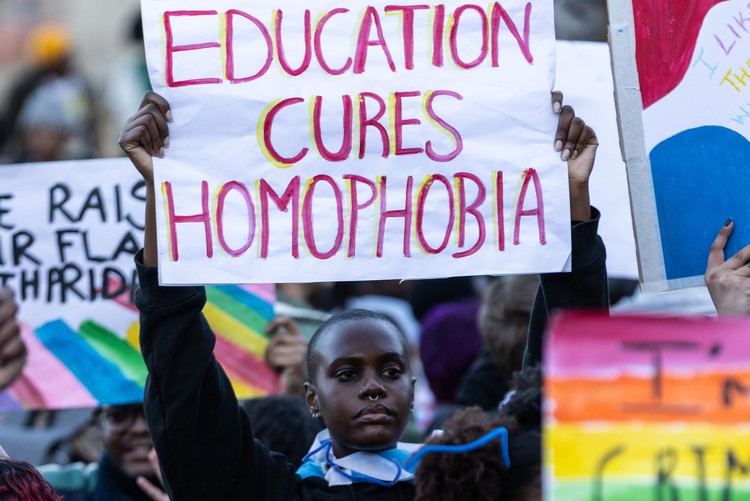Queer rights: The World Bank must stand firm on Uganda
The fight for equality demands international support
A protest in favour of gay rights in Uganda at the University of Cape Town in July 2023. Archive photo: Ashraf Hendricks
The World Bank is considering resuming lending to Uganda despite the country’s recent enactment of the Anti-Homosexuality Act. Yet the “mitigation measures” proposed by the Ugandan administration to prevent discrimination and exclusion within World Bank projects are insufficient and unenforceable. For the World Bank to endorse them risks undermining its credibility as a champion of inclusive development and threatens to discredit Ajay Banga’s ambitious development agenda a year into his mandate as World Bank president.
The act, passed in May 2023, has led to increased stigma, violence, and exclusion of LGBTQ+ individuals in Uganda. In August 2023, the World Bank halted the authorisation of any new loans, in accordance with its new policy on anti-discrimination, until measures are implemented to ensure that LGBTQ+ people have equal access to its projects. However, the current consideration to resume lending without robust support for the affected populations undermines this commitment.
The proposed mitigation measures fail on multiple fronts. They do not explicitly address discrimination based on sexual orientation or gender identity, instead referring vaguely to “vulnerable and marginalised individuals or groups.” This lack of specificity fails to acknowledge that the act bars LGBTQ+ people from development efforts. The World Bank’s endorsement of this approach undermines the basic principle that an effective non-discrimination policy should name the groups it protects.
Resuming lending to Uganda amid new corruption scandals involving top government officials, such as Speaker of Parliament Anita Among, only compounds the issue. Among’s baseless accusations in March this year that “homosexuals” are behind the allegations of embezzlement she faces highlight the deteriorating governance and gap between inflammatory rhetoric and the trust the Bank places in these non-committal “mitigation measures”.
World Bank President Ajay Banga’s leadership is critical in this complex situation. Banga’s tenure has marked a commitment to inclusive and sustainable development in opposition to his predecessor. However, moving forward with lending to Uganda signals that the World Bank is willing to support countries that exclude LGBTQ+ people as long as the government adopts ineffective and perfunctory policies.
The international community, particularly the Bank’s largest shareholder, the United States, must hold the World Bank accountable. The Bank’s Environmental and Social Framework mandates specific measures to address risks faced by vulnerable groups. Mitigation measures must explicitly include sexual orientation and gender identity protections, backed by enforceable guidelines and independent monitoring.
For Uganda, this means unequivocal protections for LGBTQ+ individuals. Anything less would betray the principles the World Bank purports to uphold.
As activists committed to human rights and social justice, we urge the World Bank to stand firm and demand concrete responses from the government of Uganda. Human rights violations not only undermine development but also constitute self-inflicted economic wounds. The fight for LGBTQ+ equality requires unwavering support from the international community, and the World Bank must rise to the occasion.
Views expressed are not necessarily those of GroundUp.
Support independent journalism
Donate using Payfast

Don't miss out on the latest news
We respect your privacy, and promise we won't spam you.
Next: Man found dead after arrest: family demands answers from police
Previous: Judge blocks government plan to tell private hospitals and doctors where they can go
© 2024 GroundUp. This article is licensed under a Creative Commons Attribution-NoDerivatives 4.0 International License.
You may republish this article, so long as you credit the authors and GroundUp, and do not change the text. Please include a link back to the original article.
We put an invisible pixel in the article so that we can count traffic to republishers. All analytics tools are solely on our servers. We do not give our logs to any third party. Logs are deleted after two weeks. We do not use any IP address identifying information except to count regional traffic. We are solely interested in counting hits, not tracking users. If you republish, please do not delete the invisible pixel.

